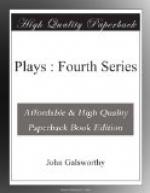Poulder. We will all go, Miss.
L. Anne. [Rushing out from behind his legs] No—me!
[She eludes miss
Stokes and vanishes, followed by that
distracted but still
well-mannered lady.]
Poulder. [Looking at his watch] ’Enry, leave the cooler, and take up the wine; tell Thomas to lay it out; get the champagne into ice, and ’ave Charles ’andy in the ’all in case some literary bounder comes punctual.
[Henry takes up the wine and goes.]
Press. [Above his head] I say, let me down. This is a bit undignified, you know. My paper’s a great organ.
Poulder. [After a moment’s hesitation] Well—take ’im down, James; he’ll do some mischief among the bottles.
James. ’Op off your base, and trust to me.
[The, press
slides off the bin’s edge, is received by James,
and
not landed gently.]
Poulder. [Contemplating him] The incident’s closed; no ill-feeling, I hope?
Press. No-o.
Poulder. That’s right. [Clearing his throat] While we’re waitin’ for Lord William—if you’re interested in wine—[Philosophically] you can read the history of the times in this cellar. Take ’ock: [He points to a bin] Not a bottle gone. German product, of course. Now, that ’ock is ’sa ‘avin’ the time of its life—maturin’ grandly; got a wonderful chance. About the time we’re bringin’ ourselves to drink it, we shall be havin’ the next great war. With luck that ’ock may lie there another quarter of a century, and a sweet pretty wine it’ll be. I only hope I may be here to drink it. Ah! [He shakes his head]—but look at claret! Times are hard on claret. We’re givin’ it an awful doin’. Now, there’s a Ponty Canny [He points to a bin]- if we weren’t so ’opelessly allied with France, that wine would have a reasonable future. As it is—none! We drink it up and up; not more than sixty dozen left. And where’s its equal to come from for a dinner wine—ah! I ask you? On the other hand, port is steady; made in a little country, all but the cobwebs and the old boot flavour; guaranteed by the British Nary; we may ’ope for the best with port. Do you drink it?
Press. When I get the chance.
Poulder. Ah! [Clears his throat] I’ve often wanted to ask: What do they pay you—if it’s not indelicate?
[The press shrugs his shoulders.]
Can you do it at the money?
[The press shakes his head.] Still—it’s an easy life! I’ve regretted sometimes that I didn’t have a shot at it myself; influencin’ other people without disclosin’ your identity—something very attractive about that. [Lowering his voice] Between man and man, now-what do you think of the situation of the country—these processions of the unemployed—the Red Flag an’ the Marsillaisy in the streets—all this talk about an upheaval?




